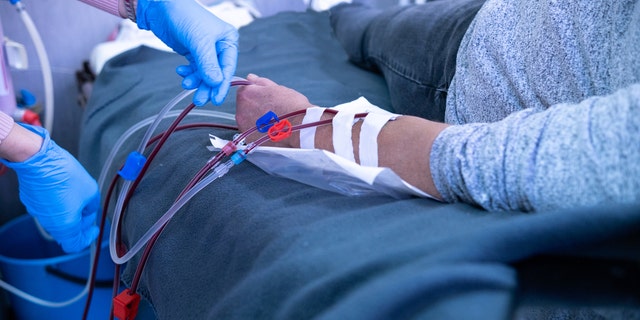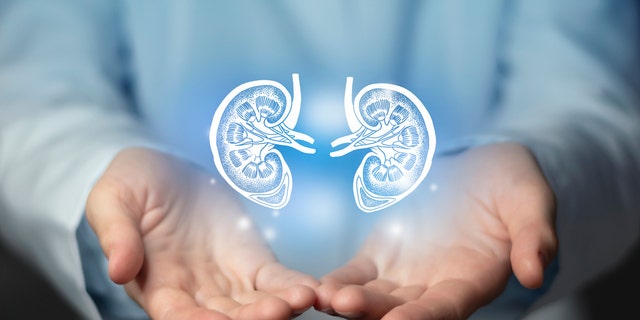Tina Turner suffered from kidney disease before her death: 'I have put myself in great danger' - Fox News
Following Tina Turner's death on May 24 at age 83, it was reported that the legendary singer had died of natural causes.
The "Queen of Rock 'n' Roll" had struggled with several health issues, however, including long-term kidney disease.
As recently as March 9, on World Kidney Day, Turner announced her support of an international campaign for kidney health via Instagram.
Turner shared in the post how her failure to seek treatment had harmed her health and endangered her life.
TINA TURNER MOURNED BY HOLLYWOOD AFTER ICON'S DEATH AT 83: 'SIMPLY THE BEST'
"My kidneys are victims of my not realizing that my high blood pressure should have been treated with conventional medicine," the singer wrote on Instagram.
"I have put myself in great danger by refusing to face the reality that I need daily, lifelong therapy with medication. For far too long, I believed that my body was an untouchable and indestructible bastion."

"I have put myself in great danger by refusing to face the reality that I need daily, lifelong therapy with medication," Tina Turner wrote in March 2023. (Getty Images)
Turner's battle with kidney issues began in 1978, when she was diagnosed with hypertension.
Not realizing the danger that her high blood pressure posed, she never made much of an effort to control it, as she wrote in a story posted on ShowYourKidneysLove.com, a kidney awareness website.
"In 1985, a doctor gave me a prescription for pills, of which I was supposed to take one a day, and that was it," she wrote. "I didn't give it any more thought."
"I have put myself in great danger by refusing to face the reality that I need daily, lifelong therapy with medication."
It wasn't until 2009, when the "poorly controlled hypertension" caused the singer to suffer a stroke, that Turner started to understand the function and purpose of the kidneys.
"This is when I first learned that my kidneys didn't work that well anymore," Turner wrote. "They had already lost 35% of their function."
The singer continued taking blood pressure medication, but she believed it only made her feel worse.
FRIENDS SHORTEN KIDNEY PATIENTS' LONG WAITS FOR TRANSPLANTS TO MERE MONTHS BY DONATING ORGANS
"With time, I developed a fatal dislike of these pills," she wrote. "I remembered relishing life before I started taking them and wished I could be as clear-headed and energetic as I used to be."
Eventually, Turner gave up the conventional medication in favor of homeopathic medicine — a decision that ultimately put her life in danger.

Turner's battle with kidney issues began in 1978, when she was diagnosed with hypertension that went uncontrolled for a long time. (Getty Images)
"I had not known that uncontrolled hypertension would worsen my renal disease and that I would kill my kidneys by giving up on controlling my blood pressure," Turner wrote in the online story. "I never would have replaced my medication (with) the homeopathic alternatives if I had an idea how much was at stake for me."
"Thanks to my naivety, I had ended up at the point where it was about life or death," she wrote.
By this time, Turner was suffering from signs of late-stage kidney disease, including fatigue, nausea and irritability.
HOW TINA TURNER FINALLY FOUND HAPPINESS
"The doctors made it very clear that the consequences of my decision were irreversible," the singer wrote. "My kidney function had reached its all-time low."
"I realized that the struggle for healing is always also a struggle for accurate information."
Turner's only option was to start dialysis, which is a treatment that removes excess fluid and waste from the blood when the kidneys cannot function properly.
"I realized that the struggle for healing is always also a struggle for accurate information," the singer wrote. "For example, I had not been aware that chronic kidney failure is called a 'silent killer' because symptoms do not become noticeable until 80% of renal tissue is lost."

In 2017, Turner received a life-saving kidney transplant from her husband, Erwin Bach (pictured). (Getty Images)
In 2017, Turner received a life-saving kidney transplant from her husband, Erwin Bach, who she'd married in 2013 after they'd been together for 27 years — but the months after the surgery were riddled with challenges.
"From time to time, my body tried to reject the donor kidney, as it frequently happens after a transplantation," the singer explained. "Every so often, this required more hospital admissions."
"The doctors made it very clear that the consequences of my decision were irreversible."
Turner continued to suffer from nausea, dizziness and memory loss.
"I am on multiple prescriptions and take great care to follow my doctors' orders meticulously, for I know that I can trust them and their therapies," she wrote.
TEEN DENIED KIDNEY TRANSPLANT BECAUSE SHE'S NOT VACCINATED FOR COVID, SAY PARENTS
Just two months after the Instagram post announcing her support of kidney health awareness and sharing her own story, Turner died in her Switzerland home.
What is kidney disease?
Healthy kidneys have three key jobs, per the National Kidney Foundation (NKF). They remove waste products and excess fluid from the body, help to control blood pressure and play a role in producing red blood cells.
Kidney failure, also known as renal failure, occurs when 85-90% of the organs' function is gone and they can no longer work on their own. This causes extra fluid and toxic waste to build up in the body, which can cause life-threatening conditions.
UBER DRIVER DONATES KIDNEY TO RIDER HE MET NEARLY 3 YEARS AGO: 'GOD MUST HAVE PUT YOU IN MY CAR'
"In addition to filtering out waste products from the blood, the kidneys are also responsible for balancing electrolyte and fluid levels in the body," Dr. Mark Drucker, a weight loss-focused physician and co-founder of the Center for Advanced Medicine in Encinitas, California, told Fox News Digital.
"As the kidneys become damaged and kidney disease develops, the kidneys also lose their ability to balance electrolyte and fluid levels."

Dialysis is a treatment that removes excess fluid and waste from the blood when the kidneys cannot function properly. (iStock)
The two primary causes of kidney disease are high blood pressure, as was the case for Turner, and diabetes.
"Hypertension can cause the blood vessels leading to the kidneys to become weaker, narrower or hardened, which can lead to decreased blood flow to the kidneys," said Kersten Bartelt, a Wisconsin-based clinician and researcher who recently completed a study on chronic kidney disease for Epic Research, in an email to Fox News Digital.
BLACK WOMEN AGES 20-50 ARE TWICE AS LIKELY TO HAVE HIGH BLOOD PRESSURE THAN WHITE WOMEN, SAYS NEW STUDY
"With reduced blood flow, the kidneys become less effective at filtering blood," she added.
Certain diseases, injuries and inherited disorders can also result in kidney damage.
The stages of kidney disease
There are five stages of kidney disease, said Drucker.
Stage one is considered mild — "the kidneys continue to work almost as well as normal," Drucker said.
During stage two, the kidneys continue to work adequately and there are minimal symptoms, if any.
In stage three, symptoms such as fatigue, swelling of the hands and feet, and dry skin most often begin, Drucker said. "The kidneys are losing their ability to adequately filter the blood."

There are five stages of kidney disease, shared Dr. Mark Drucker, a weight loss-focused physician and co-founder of the Center for Advanced Medicine in Encinitas, California. (iStock)
"In stage four, the kidneys have a dramatically reduced ability to function," he said.
Stage five is considered kidney failure, which normally requires either dialysis or a kidney transplant.
"There are more than 500,000 Americans receiving dialysis and there are more than 250,000 Americans who have received a kidney transplant," Drucker said.
"There are approximately 100,000 Americans on the list for a kidney transplant — however, due to a shortage of donors, only about 25% are able to receive a donor kidney," he added.
"There are approximately 100,000 Americans on the list for a kidney transplant — however, due to a shortage of donors, only about 25% are able to receive a donor kidney."
In most cases, people don't experience symptoms until they are already in renal failure.
The main symptoms include appetite, fatigue, sleep problems, anemia, weakness, unexplained weight loss, itching, muscle cramps and swelling of the feet or ankles.
People in renal failure require continuous treatment to stay alive. The two options for treatment are dialysis and a kidney transplant.
CLICK HERE TO SIGN UP FOR OUR HEALTH NEWSLETTER
"The dialysis treatments or transplanted kidneys will take over some of the work of your damaged kidneys and remove wastes and extra fluid from your body," NKF states on its website. "This will make many of your symptoms better."
Other treatments may include medications, dietary restrictions, regular exercise and restriction of salt intake.
More than one in seven, or 15% of U.S. adults, have chronic kidney disease, according to the Centers for Disease Control and Prevention (CDC).
CLICK HERE TO GET THE FOX NEWS APP
As many as nine in 10 adults with chronic kidney disease are not aware that they have it.
People 65 years of age and older are at higher risk of the disease, making up 38% of the cases, compared to 12% of those aged 45 to 64 and just 6% of those aged 18 to 44.
Comments
Post a Comment